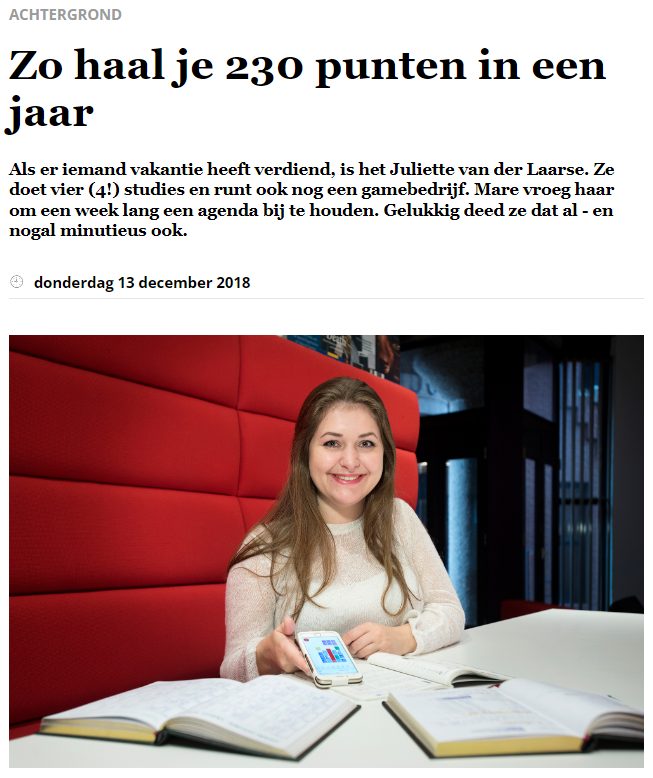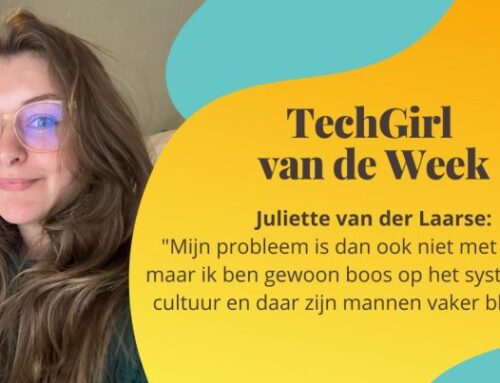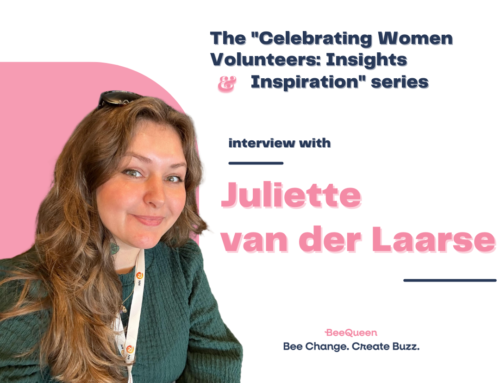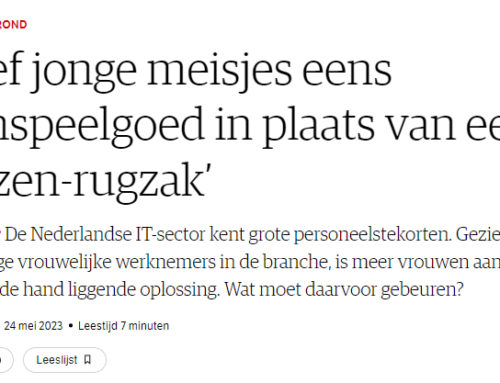In November 2018, I was approached by Mare Magazine, the weekly publication for Leiden University, for an interview. They had picked up on the fact that I was studying multiple bachelor’s degrees while also running a small game development studio. It seemed like a good opportunity to explain how I managed it all, so we met in one of the university buildings next to the library for an in-person conversation.
During the interview, I shared the practicalities behind my studies—how I didn’t follow all the programs full-time but mixed courses together, and that for me, it was mostly a matter of planning. I’ve always been a fast reader, a logical thinker, and a strong writer, so I never found the workload overwhelming. Being neurodiverse, or gifted (though I’m not fond of the stigma that comes with that label), has played a big role in this. For me, deep diving into topics, sometimes to the point of losing track of time, was just part of the process. I enjoyed experimenting with different learning methods, creating systems to manage everything, and making my education work for me. I was also open to my tendency for perfectionism, and that it wasn’t driven by a need for high grades, but mostly the need to feel like I fully controlled and understood the subject.
At the time, I thought it was an opportunity to discuss the joy I found in learning and how I had developed my own ways of staying on top of things. But I was cautious during the interview. I downplayed what I was doing because by then, I had already received enough remarks from others in person to know how it might be perceived. I almost declined the interview entirely, but I decided to go for it, while carefully explaining why this was doable for me and downplaying my work.
When the interview was published, I was initially happy with it. I thought it read as a nuanced read with a reasonable story. But that feeling didn’t last long.
What followed was an onslaught of online hate—something I feared but I wasn’t prepared for the scale of it. People accused me of being a sad overachiever, a show-off, shallow, fake. I was even called a “professor pleaser,” (to put it politely) and I received private messages with hateful and sometimes even aggressive comments. The criticisms were nonsensical, claiming that I should be checked into a psychiatric hospital or that I was trying to impress so badly that I made myself a laughing stock, and that ‘nobody would take me seriously so studying this much was useless’.

None of it reflected reality. I wasn’t doing any of this to impress anyone; studying was simply my hobby. I loved every moment of it, and I wasn’t trying to stand out or show off. Yet, the harsh comments confirmed something I had already started to internalize: people who stand out, for whatever reason, often get mowed down. After that, I found myself hiding more and more of who I was.
It’s one of the reasons why I now prefer the term “neurodiverse” instead of “gifted”—it feels less intimidating and more accurate, conveying that our brains are wired differently, not better or worse. The experience with this interview was a turning point. It fed into a habit I’ve developed of downplaying everything I do, making myself small so that I’m more “digestible” for others. It’s something I continue to work on, but sometimes, I still catch myself minimizing my achievements or attributing them entirely to luck or others. It has become a coping mechanism, a way to hide whenever I am visible.
What was supposed to be a fun interview ended up having a profound impact on me, reinforcing my tendency to make myself smaller. It was a hard lesson in dealing with hate, one I think anyone who steps into the spotlight might have to face at some point.
Article & Translation
In November 2018, I was approached by Mare Magazine, the weekly publication for Leiden University, for an interview. They had picked up on the fact that I was studying multiple bachelor’s degrees while also running a small game development studio. It seemed like a good opportunity to explain how I managed it all, so we met in one of the university buildings next to the library for an in-person conversation.
During the interview, I shared the practicalities behind my studies—how I didn’t follow all the programs full-time but mixed courses together, and that for me, it was mostly a matter of planning. I’ve always been a fast reader, a logical thinker, and a strong writer, so I never found the workload overwhelming. Being neurodiverse, or gifted (though I’m not fond of the stigma that comes with that label), has played a big role in this. For me, deep diving into topics, sometimes to the point of losing track of time, was just part of the process. I enjoyed experimenting with different learning methods, creating systems to manage everything, and making my education work for me. I was also open to my tendency for perfectionism, and that it wasn’t driven by a need for high grades, but mostly the need to feel like I fully controlled and understood the subject.
At the time, I thought it was an opportunity to discuss the joy I found in learning and how I had developed my own ways of staying on top of things. But I was cautious during the interview. I downplayed what I was doing because by then, I had already received enough remarks from others in person to know how it might be perceived. I almost declined the interview entirely, but I decided to go for it, while carefully explaining why this was doable for me and downplaying my work.
When the interview was published, I was initially happy with it. I thought it read as a nuanced read with a reasonable story. But that feeling didn’t last long.
What followed was an onslaught of online hate—something I feared but I wasn’t prepared for the scale of it. People accused me of being a sad overachiever, a show-off, shallow, fake. I was even called a “professor pleaser,” (to put it politely) and I received private messages with hateful and sometimes even aggressive comments. The criticisms were nonsensical, claiming that I was mentally ill or that I was trying to impress so badly that I made myself a laughing stock, and that ‘nobody would take me seriously so studying this much was useless’.
None of it reflected reality. I wasn’t doing any of this to impress anyone; studying was simply my hobby. Nerdy, I know, but I loved every moment of it, and I wasn’t trying to stand out or show off. Yet, the harsh comments confirmed something I had already started to internalize: people who stand out, for whatever reason, often get mowed down. After that, I found myself hiding more and more of who I was.
It’s one of the reasons why I now prefer the term “neurodiverse” instead of “gifted”—it feels less intimidating and more accurate, conveying that our brains are wired differently, not better or worse. The experience with this interview was a turning point. It fed into a habit I’ve developed of downplaying everything I do, making myself small so that I’m more “digestible” for others. It’s something I continue to work on, but sometimes, I still catch myself minimizing my achievements or attributing them entirely to luck or others. It has become a coping mechanism, a way to hide whenever I am visible.
What was supposed to be a fun interview ended up having a profound impact on me, reinforcing my tendency to make myself smaller. It was a hard lesson in dealing with hate, one I think anyone who steps into the spotlight might have to face at some point.
Article & Translation







